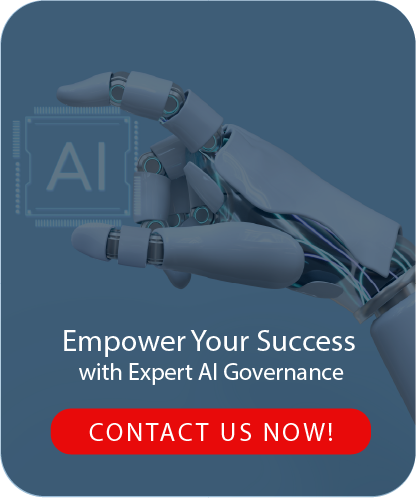In today’s evolving business landscape, companies are managing increasingly vast amounts of data, including sensitive information related to AI and machine learning models. Ensuring the integrity of this data, while complying with complex regulations, has never been more important. This is where data governance consulting becomes essential, providing organizations with a structured approach to managing data and mitigating risks associated with AI deployment.
A robust data governance framework is key to handling both traditional data and AI-specific data. It establishes clear rules and standards for data use, ensuring that companies can not only make better business decisions but also comply with privacy laws and ethical guidelines when developing or using AI systems.
Data governance consulting offers a comprehensive approach that supports organizations in building trust and transparency around their data while navigating the regulatory complexities of AI integration. By working with experienced consultants, businesses can create a governance framework that’s adaptable to the evolving technological landscape and regulatory environment.

Key Takeaways
- Data governance consulting ensures both data integrity and compliance in the context of AI development.
- A structured governance framework helps manage AI data responsibly, reduce risks, and maintain regulatory compliance.
- Professional consulting services enable organizations to navigate complex data landscapes and AI ethics.
- Implementing data governance frameworks can improve decision-making and reduce compliance-related penalties.
- Strong governance practices increase operational efficiency, especially in managing AI-related data and models.
Understanding the Four Pillars of Data Governance in AI and Business Operations
A strong data governance framework encompasses four critical pillars. When applied to AI, these pillars ensure that data is handled responsibly, models are transparent, and regulatory guidelines such as GDPR, HIPAA, and AI ethics standards are met.
Data Quality and Validation Processes
For AI, ensuring data quality is crucial for developing accurate models and minimizing bias. This pillar includes regular checks, audits, and validation processes to maintain data accuracy, completeness, and reliability especially for AI systems relying on vast datasets to make predictions and decisions.
Data Stewardship and Ownership
Data stewardship is vital for managing both structured and unstructured data, particularly when it comes to AI model training data. This pillar emphasizes accountability across teams to ensure the right data is being used, stored securely, and appropriately governed. Clear ownership and responsibilities also help mitigate risks related to AI system transparency.
Data Protection and Regulatory Compliance
In the AI landscape, data protection is paramount. Organizations must adhere to strict compliance requirements such as GDPR and HIPAA. This pillar ensures that sensitive AI-related data is protected from breaches, and that models and their outputs remain transparent and ethically sound.
Enterprise Data Management Strategy
AI data management strategies need to consider the entire lifecycle, from data collection to processing, storage, and eventual deletion. This strategy connects all the other pillars, ensuring that AI data governance aligns with business goals and regulatory expectations. Regular updates to the governance strategy are essential as technology and regulations evolve.
| Pillar | Key Focus | Example |
|---|---|---|
| Data Quality | Accuracy, Completeness | Real-time validation for AI datasets |
| Data Stewardship | Accountability, Consistency | Cross-team data coordination for AI models |
| Data Protection | Security, Compliance | Encryption for sensitive AI data, GDPR adherence |
| Data Management | Strategy, Lifecycle | AI data retention and deletion policies |

Data Governance Consulting: Services and Implementation Roadmap
Data governance consulting provides a structured approach to managing data across your organization, including AI-driven operations. Expert consultants guide businesses through complex data landscapes, ensuring data is used effectively, securely, and ethically while complying with regulatory frameworks.
- Initial Assessment and Gap Analysis Consultants begin by assessing how your data is currently being managed, identifying gaps in governance related to AI systems. This initial analysis helps create a customized plan that aligns with your organization's needs and the specific challenges posed by AI data.
- Strategy Development and Policy Creation After identifying areas for improvement, consultants help develop data governance policies that address AI data handling. These policies ensure that data used in AI models is compliant with regulations and ethical guidelines. A strong strategy can reduce data errors by more than 30%, leading to better AI model performance and risk mitigation.
- Data Catalog Implementation Organizing your data through a comprehensive data catalog makes it easier for teams to find and understand AI datasets. Metadata management improves data accessibility and ensures that AI models are trained with the highest quality data. A well-structured catalog can increase data reuse by up to 60%, enhancing model accuracy and reducing redundancies.
- Compliance and Security Integration Data governance consulting also ensures that your organization’s AI systems comply with security protocols and regulations. With ongoing monitoring and audit trails, consultants help safeguard against costly data breaches, which can lead to fines exceeding $14 million per violation. Regular reviews of your AI models and data handling procedures ensure that you remain compliant and secure.
| Data Governance Component | Potential Impact |
|---|---|
| Comprehensive Framework | 50% improvement in AI data quality |
| Clear Roles and Responsibilities | 35% improvement in AI model accountability |
| Effective Data Management | 25% improvement in AI model decision-making |
| Master Data Management | 20% reduction in AI-related tasks |

Transforming Business Operations Through Effective Data Governance for AI
A well-implemented data governance framework does more than just ensure compliance it can transform your business operations, especially when it comes to AI. Strong governance improves decision-making, reduces risks, and fosters interdepartmental collaboration, enabling organizations to unlock the full potential of AI while maintaining ethical standards.
Enhanced Decision-Making Capabilities
High-quality data is essential for informed business decisions, particularly in AI-driven environments. With a strong governance framework in place, companies see fewer mistakes in data analysis, allowing them to make more accurate predictions and understand customer behavior more effectively.
Operational Efficiency Improvements
A structured data governance framework streamlines operations and reduces inefficiencies. For AI, having a reliable data strategy minimizes wasteful tasks and optimizes the model-building process. Companies can save valuable time by ensuring their data is clean, organized, and readily available for analysis.
Risk Mitigation and Data Security
AI-related data can pose significant security risks if not properly governed. Implementing data governance minimizes risks, especially for AI systems dealing with sensitive data. Organizations with strong data governance frameworks are better protected from compliance-related fines and data breaches, ensuring their AI models operate securely.
Interdepartmental Collaboration Benefits
With data governance, teams across departments can collaborate more effectively. Data stewardship ensures that all teams have access to accurate, reliable, and compliant data, resulting in better interdepartmental cooperation and a 45% increase in employee data management competency.
| Data Management Impact | Percentage Improvement |
|---|---|
| Reduction in Data Conflicts | 35% |
| Improvement in Data Reliability | 30% |
| Reduction in Compliance Fines | 40% |
| Increase in Employee Data Skills | 45% |
Building a Sustainable Data Governance Culture in the Age of AI
Creating a lasting data governance culture is crucial as organizations embrace AI. With an estimated 180 zettabytes of data expected to be created by 2025, organizations need a strong governance culture that keeps data quality high and ensures compliance with evolving regulations.
By establishing clear data governance policies, offering ongoing training, and aligning governance with business goals, companies can create a sustainable data governance culture. This approach fosters accountability, enhances employee skills, and ensures that AI systems are governed ethically and securely.
It’s essential to measure data governance effectiveness through KPIs and KRIs, ensuring that your AI data management continues to meet both business objectives and regulatory standards. With a focus on continuous improvement, organizations can adapt to new challenges and build a governance framework that grows with their business and evolving AI technologies.
Why Partner with Vinali Advisory for Data Governance Consulting for AI
Partnering with Vinali Advisory for data governance consulting ensures that your AI systems are not only efficient but also ethically sound and compliant with evolving regulations. Our team of experts brings a deep understanding of both the technical and regulatory aspects of AI, providing tailored solutions that fit your unique business needs.
We help you establish robust governance frameworks that protect data integrity, minimize risks, and enhance transparency in your AI operations. With Vinali Advisory, you gain access to cutting-edge strategies that optimize data quality, ensure regulatory compliance, and drive smarter AI decision-making. Let us be your trusted partner in navigating the complexities of AI governance while fostering innovation and trust within your organization.
Partner with Vinali Advisory to ensure ethical, compliant, and efficient AI operations. Let’s drive innovation together! Get started now!
FAQ
What is data governance consulting for AI?
Data governance consulting helps businesses manage their data, especially AI-driven data, responsibly and ethically. It ensures compliance with regulations, improves data quality, and strengthens AI models.
Why is a data governance framework essential for AI?
A strong framework ensures that AI data is accurate, secure, and compliant with laws like GDPR and HIPAA. It also minimizes biases and helps organizations make informed decisions using their AI systems.
How does data governance consulting impact AI models?
Consulting improves data quality, reduces risks, and ensures AI models are built on reliable, secure, and compliant data. This helps create more accurate and ethical AI solutions.
How does data governance address regulatory compliance in AI?
Consultants ensure that your data handling practices meet compliance requirements for AI models, including security protocols, privacy laws, and ethical guidelines.
What benefits can a company expect from data governance consulting for AI?
Data governance consulting helps companies improve decision-making, streamline operations, reduce compliance-related penalties, and increase collaboration, all while ensuring their AI systems are ethical, secure, and effective






